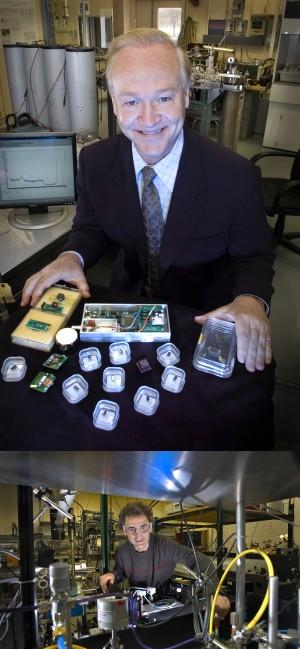Nov 20 2007
Ralph James and Trevor Sears, scientists at the U.S. Department of Energy's Brookhaven National Laboratory, have been named Fellows of the Optical Society of America (OSA). Limited to ten percent of the total OSA membership, Fellows of the organization have served with distinction in the advancement of optics. The two scientists will each receive a Fellow plaque and a pin at an OSA meeting in San Jose, California, in May 2008.
 Dr. Ralph James (top), Dr. Trevor Sears (bottom)
Dr. Ralph James (top), Dr. Trevor Sears (bottom)
Ralph James was recognized for "exceptional technical accomplishments and leadership leading to advances in nonlinear optics and optoelectronic sensors for lasers, spectroscopy and imaging."
James studies how the properties of semiconductors change when exposed to intense laser pulses. His data are used to make infrared lasers work effectively for a wide variety of applications, from medical to military. This research also involves the use of high-intensity laser pulses to thermally process semiconductor crystals for producing solar cells. In related work, James developed a new class of small, solid-state radiation detectors that can efficiently detect both x-rays and gamma rays at room temperature. They can also identify specific isotopes responsible for the radiation. These detectors are used in a variety of applications, including medical imaging, nuclear nonproliferation, environmental monitoring, and nuclear and space sciences.
After earning a Ph.D. in applied physics from the California Institute of Technology in 1980, James was a Eugene P. Wigner Fellow at DOE's Oak Ridge National Laboratory from 1981 to 1984. In 1984, he joined the technical staff of DOE's Sandia National Laboratories, and in 2001, he came to Brookhaven Lab as the Associate Laboratory Director for Energy, Environment & National Security.
James has numerous awards to his credit, including Discover magazine's 1997 "Innovator of the Year" award in the field of imaging. He also is a four-time winner of R&D Magazine's R&D 100 Award, which honors the top 100 inventions of the year, and co-winner of one of the "World's 50 Best Technologies" awards, from the National Association for Seed and Venture Capital Funds, as well as the recipient of many other invention and technology awards.
James holds nine patents, has authored or co-authored more than 350 scientific publications, and has edited 18 books. He is a Fellow of the American Association for the Advancement of Science, American Physical Society, Institute for Electrical and Electronic Engineers and the International Society for Optical Engineering.
Trevor Sears was recognized "for advancing the molecular spectroscopy of transient species through the invention of new techniques for their study, thereby obtaining valuable information about these transients."
Sears uses laser spectroscopy to study molecules in chemical reactions involved in burning hydrocarbon fuels. Measuring how the molecules absorb and emit light helps to decipher their structures, while determining the amount of light a sample absorbs at a particular wavelength reveals the quantity of an absorbing molecule in the sample. The long-term benefits of this research are a deeper understanding of the chemistry of combustion and cleaner and more efficient use of hydrocarbon fuels.
Sears earned a Ph.D. in chemistry from Southampton University, England, in 1979, and he was a research fellow at Bell Telephone Laboratories from 1979 to 1980. He then joined the National Research Council of Canada, where he worked as a research associate until 1983. In that year, he became a staff scientist at Brookhaven Lab, rising through the ranks to become a senior chemist in 1995. Sears holds a joint appointment, working half time at Brookhaven and half time as a professor of chemistry at Stony Brook University.